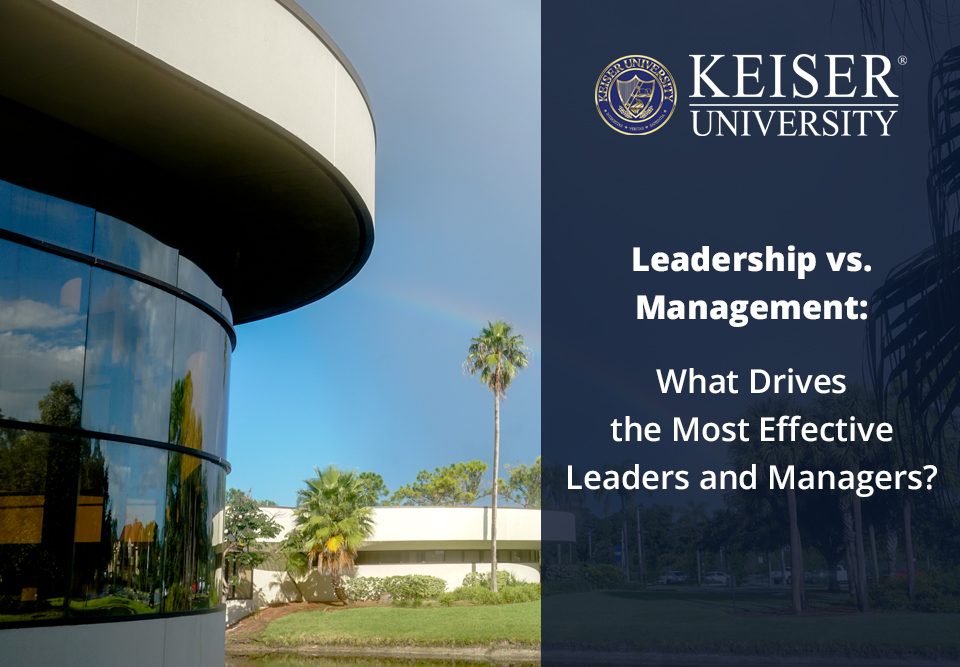You have big plans for your career and hope to one day rise through the ranks to achieve a position of influence. How you define this role could say a lot about your career trajectory. Chances are that one of two main descriptors has entered your lexicon: leadership or management.
These terms share a lot in common and are even used interchangeably by many professionals — but they are not, as you might assume, one and the same. Determining their nuances could be integral to reaching your most ambitious goals. As such, we have highlighted the similarities and differences between leadership and management. Keep reading to discover what exactly sets these concepts apart — and how these distinctions might play into your future career.
Is There a Difference Between Leadership and Management?
Absolutely! Leadership and management are closely related. Both involve positions of influence, authority and legislative power. How that influence, authority and power is implemented and maintained over time, may differ significantly, and are the deciding factors in being successful in either position. It’s easier to compare and contrast leadership and management when equipped with clear definitions of both concepts. Below is an in-depth breakdown:
How Is Leadership Defined?
Leadership is about influence and guidance. Whether working as an executive, a teacher or in some other capacity, a true leader holds a strong and compelling vision for the future, as well as the passion necessary to bring that vision to life — and the power of effective communication to get others similarly excited to buy into your vision. This is a people-focused concept rather than an exclusive exploration of processes or techniques.
Empowerment is a central component of effective leadership; leaders remind others that they are effective change agents. They light a fire to kickstart ambitious campaigns, often with the goal of enacting long-term change through innovation. It can be difficult to convince skeptics to get on board with these sweeping transformations, but that is where leaders shine.
Our definition highlights what leadership is and how it operates when it is effective. Experts at McKinsey expand on this by identifying four main types of behavior that account for effective leadership in most situations:
- Seeking many different perspectives
- Consistently being supportive
- Maintaining a results-oriented approach
- Solving problems effectively
How Is Management Defined?
Management is administering the work and ensuring the day-to-day activities get done as they should. This is the why and the how of achieving ambitious goals, which, no matter how exciting or inspiring they may be, will not result in success without carefully designed procedures and a system of delegation.
At the organizational level, management is all about organizing and optimizing workflows and everyday operations with the intention of achieving specific goals. Through effective management, organizations can improve their profits, boost customer or client satisfaction and keep costs to a minimum. Throughout all management processes, accountability plays a key role in keeping all stakeholders on track.
McKinsey emphasizes the 2Cs of management: the best managers provide consistency and coherence. This means:
- Sending predictable messages
- Establishing organizational clarity
- Measuring the impact of organizational strategies
Relationship Between Leadership and Management
Leadership and management may be distinct concepts, but there is a great deal of overlap. Often, the best leaders also have management experience — and vice versa. Many college programs provide a deep dive into both concepts, so aspiring leaders and executives can be prepared to take on opportunities in either area.
Even when they do not technically hold the title of ‘leader,’ management professionals often take on this role in some capacity. They may be asked to develop or build on innovative visions, which in turn, they are expected to execute with staff buy-in. Similarly, visionary leaders may find that, without the nitty-gritty details of management, their goals fall short.
Some leadership styles draw heavily on management concepts (and vice versa). For example, while transformational and servant leadership styles largely echo the standard leadership definition outlined above, transactional leadership heavily incorporates a variety of management practices, as does authoritative leadership to a lesser extent. In addition, appreciative leadership encourages leaders to adopt a positive and strengths-based mindset. Instead of focusing on weaknesses or problems, leaders concentrate on identifying and leveraging the strengths and positive aspects of individuals and teams. This is great for building and nurturing culture and relationships.
Difference Between Managing and Leading
As we’ve touched on, the main differences between leadership and management come down to vision versus execution. Leaders play a vital role in brainstorming and developing innovative ideas, which, with proper assistance from managers, can move businesses far beyond the status quo. Meanwhile, managers understand that processes matter just as much as the individuals involved in pursuing goals. They optimize these processes to allow for the better flow and execution of new ideas.
Leadership vs. Management Characteristics
Personality can play a huge role in determining whether a given professional is better suited to leadership or management. While there is no one proper way to be a leader or manager, certain types of people are more likely to gravitate toward these roles. Leaders and managers who understand their core style, can make the most of these innate qualities while also working to address areas for improvement.
Differences
The differences between leadership and management often come down to perspective: transformative thinking with an emphasis on individual people or detail-oriented administration with a focus on individual processes.
The former describes leadership: while they connect deeply with individual team members, leaders are ultimately focused on the long-term transformation of entire organizations, with the goal of enacting significant changes over time. As mentioned previously, McKinsey touches on this by emphasizing a results-oriented approach rather than a process-driven strategy. Meanwhile, managers develop and maintain processes that keep everything running smoothly.
The manager’s main aim isn’t necessarily to inspire significant changes, but rather, to optimize for the here and now, with the goal of making improvements wherever they’re immediately available and advantageous.
Similarities
Confidence is a key attribute for any successful leader or manager. This is developed through years of training and experience, although both leaders and managers may naturally be confident people. These individuals must also be self-aware, as this allows them to reflect on their current strengths and weaknesses — and adjust their style as needed. Other common characteristics shared by good leaders and managers include:
- Empathy
- Sensitivity
- Trustworthiness
- Passion
Skills for Leaders and Managers
Leaders and managers share many transferable skills that can prove beneficial in any industry or rung on the professional ladder. In general, leadership tends to emphasize soft skills, while technical skills are more likely to come into play when management takes over.
Differences
Leaders are driven by relationships. They enjoy getting to know a variety of individuals and discovering what exactly inspires or challenges them. They are naturally adept at communicating with all types of people, although they must also make a concerted effort to develop the in-demand skills of written communication and public speaking.
Managers often have more targeted and technical skills relating to finance, accounting or information technology. The specific skill set required for the job largely depends on the industry, the department and the management position. For example, a chief financial officer (CFO) provides strategic management for accounting activities and will therefore have extensive skills and practical experience in accounting and finance.
Similarities
Among the most important similarities between leadership and management? Decision-making and problem-solving. Both leaders and managers must take in a wealth of information and synthesize it promptly to make decisions that drive results.
The scope and nature of these decisions may differ somewhat between leaders (who often emphasize long-term, sweeping changes) and managers (who make decisions that optimize the day-to-day functionality of the workplace) but the need to make them skillfully and at critical times (and under a great deal of pressure) remains consistent.
How to Know When to Be a Leader or Manager
Many leaders or managers move into their niches simply by rising through the ranks as passionate professionals and, eventually, moving into positions of authority. They may not purposefully choose one over the other but rather realize that the blend of their natural talents and the needs of the moment dictate a particular approach. This is common in the small business world, where entrepreneurs require a blend of leadership and management savvy.
Increasingly, however, success in leadership or management means choosing a lane and developing the most relevant skills and knowledge. This could mean focusing on soft skills as a future leader or diving into technical concerns while preparing for in-depth management roles.
As we’ve seen, there can be a great deal of overlap, and there will be times when a manager needs to act more like a leader — particularly if current processes are not meeting the needs of the organization in question. In times of crisis, however, management skills need to take a step up, as a more authoritative approach may temporarily be required to drive prompt results.
Obtain the Skills to Become a Leader at Keiser
No matter how leadership or management plays into your career trajectory, you can gain vital skills by enrolling in one of the highly respected graduate programs at Keiser. Our Master of Business Administration is an amazing option for aspiring executives, but we also have programs that delve into exciting areas such as organizational leadership and educational leadership. Great leaders are needed in any field, and are a focus of many of Keiser’s graduate programs including our Doctor of Health Science and MS in Financial Technology.
In addition to varying areas of focus, we offer degrees and certificates at many levels. At Keiser, you could pursue your master’s degree, your PhD, or an Education Specialist degree. If you’re not quite sure which program is right for you, don’t hesitate to speak with one of our admissions counselors.






 The instructors at Keiser University impacted my life. They believed in my ability to become a great graphic designer, regardless of how I felt about my skills. KU helped to prepare me for the real world and got me to where I am today.
The instructors at Keiser University impacted my life. They believed in my ability to become a great graphic designer, regardless of how I felt about my skills. KU helped to prepare me for the real world and got me to where I am today.
